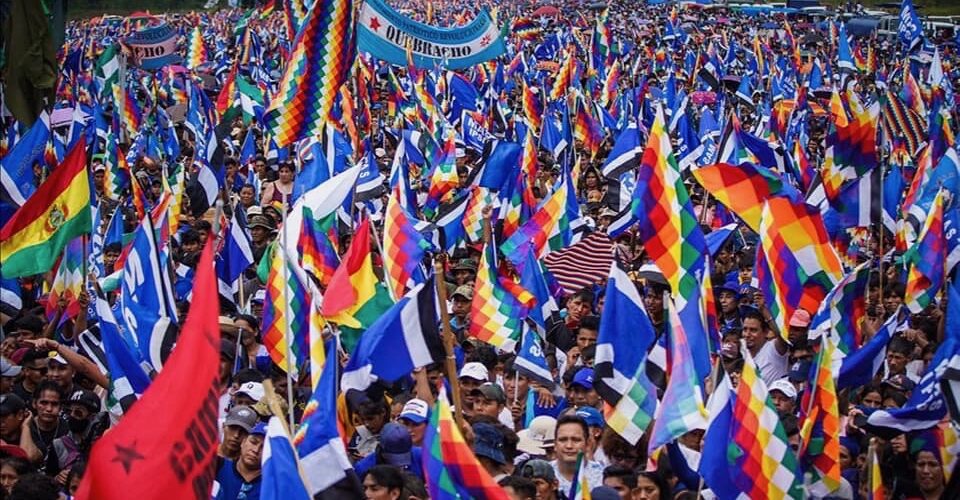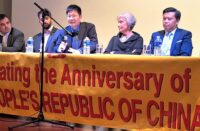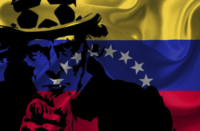Last month’s spectacular collapse of Bolivia’s Movement Towards Socialism (MAS) has felled one of the last bastions of Latin America’s “Pink Tide”, dealing a devastating blow to the country’s indigenous, peasant, and working classes. Now, Bolivians must choose between two right-wing candidates in the country’s first-ever runoff elections, while progressive movements everywhere must learn the lessons of the MAS demolition.
These seismic shifts in Bolivian politics had already played out in miniature here in El Alto, Bolivia’s second city, perched a dizzying 4,100m above sea level. El Alto (Spanish for “The Heights”) was formed by indigenous peasants fleeing the collapse of their traditional subsistence under US-backed dictatorships and the Washington Consensus of the latter half of the 20th century. Hundreds of thousands trekked to the inhospitable mountains overlooking La Paz in search of a livelihood.
In defiance of their marginalisation, Alteños took to the streets in 2003 to demand resource nationalisation and indigenous political representation. Security forces killed at least 60 protestors in the “Gas War” that followed, leading to President Gonzalo “Goni” de Lozada’s resignation and the landslide victory of MAS and Evo Morales in the 2005 elections.
Morales, Bolivia’s first indigenous president and leader of the coca-growers union, undoubtedly made great strides in advancing socialism in Bolivia. His 2009 Constitution rejected neoliberalism and transformed Bolivia from a neocolonial outpost to a plurinational state, with unprecedented autonomy granted to indigenous communities.
MAS leveraged Bolivia’s mineral wealth to massively reduce poverty and inequality, granting new social rights to women, queer, peasant, and indigenous Bolivians. This fuelled clear social shifts, evident in high rates of female legislators and a reclaimed “cholo” (native) identity. How then could such a successful project disintegrate so spectacularly?
Bolivia remains on the periphery of imperial extraction. As Argentine sociologist Maristella Svampa notes, MAS adhered to a “commodities consensus”, funding social projects through the extraction of raw materials like lithium. This left Bolivia vulnerable to price fluctuations on the international market and foreign interference.
Despite its claims to “communitarian socialism”, MAS remained a social-democratic force that failed to rein in Bolivia’s powerful comprador class. After the Washington-based Organisation of American States falsely declared Morales’s landslide 2019 electoral victory fraudulent, national elites exploited the confusion. Chief among them was Jeanine Áñez, a white supremacist and Christian fundamentalist who seized power as “interim president”, having declared her dream “of a Bolivia without satanic indigenous rituals”. The ouster was applauded in Brussels, Washington, and Silicon Valley, with Elon Musk tweeting, “We will coup whoever we want!”.
Predictably, majority-indigenous cities like El Alto erupted into protest. Áñez granted carte blanche to the military in quelling the demonstrations, culminating in the massacre of 11 protestors in Senkata, site of the earlier Gas War. Nevertheless, her position became untenable within days, forcing new elections that Morales’s Economy Minister, Luis Arce, won handily for MAS.
Despite this support, cracks began to appear. Morales’s unwillingness to relinquish power and insistence on a fourth term left him vulnerable. Moreover, it spoke to a centralisation in person rather than party, and a lack of faith in the very movements that had brought him to power. Morales viewed Arce, a Western-educated technocrat, as a figurehead and intended to run for president again in 2025. Their conflict exploded in 2024.
In June, a bizarre coup attempt saw General Juan José Zúñiga lead a convoy of vehicles to the Presidential Palace, confronting Arce before fleeing the scene. Despite initially offering support, Morales denounced the events as a “self-coup” staged by Arce to shore up support. In October, Morales posted a video of an apparent assassination attempt against him, describing the attack as “clear evidence that we are facing a fascist government”. The Arce team in turn accused Morales of staging the incident.
MAS therefore entered the 2025 campaign completely fractured and alienated from its base of support. Arce, facing plummeting approval ratings in light of the split and a prolonged economic crisis, declined to run. Interior Minister Eduardo del Castillo ran for the official MAS platform, while Andrónico Rodriguez, an activist for Evo’s own cocalero union, ran on the new Alianza Popular ticket. The indigenous senator, once hailed as the natural successor to Morales, distanced himself from the former president and his many scandals.
For his part, Morales retreated into his solid base of support, the central coca-growing region of Chapare. He called upon his supporters to nullify their votes in a futile attempt to overturn the election. While Arce called for the left to rally around a single candidate in a kind of popular front to defeat fascism, his cries went unheeded in the midst of a petulant and very public three-way bid for power.
This gave the right free rein, launching their presidential bids much earlier than the beleaguered MAS. They also exploited legal oversights MAS had failed to tackle. Campaigns must be self-financed, allowing elites to dominate. Bolivia’s major TV stations, all in private hands, held debates between the right-wing front-runners, effectively denying the left a platform.
As election day approached, the prevailing attitude among the left was defeatist. In Bolivia, any party that receives less than 3% of the vote is stripped of its legal standing. As Eduardo del Castillo’s faction of MAS collapsed, the formerly predominant party shifted to a single objective: survival. Eventually, MAS would receive just 3.16% of the vote.
Predictably, the electorate swung right, even in former MAS strongholds like El Alto. With no clear winner, a second round of voting will be held in October. Former MAS supporters flocked to Senator Rodrigo Paz Pereira’s centre-right Christian Democrats, running on a “capitalism for all” platform. Facing Paz is Jorge “Tuto” Quiroga, far-right ex-president and admirer of Argentina’s Javier Milei. Appointed by Áñez to serve as the “International Delegate to Denounce Human Rights Violations” which supposedly occurred under MAS, Quiroga promises an anarcho-capitalist Bolivia aligned with US corporate interests.
Whatever the results, the impacts will be most acute for marginalised Bolivians. While MAS’s legacy of progressive institutions and legal frameworks will offer some insulation, both candidates are planning to dismantle the state’s radical turn. The only hope for the country lies in the same social movements that brought MAS to power. Although weakened, they have demonstrated their power to effect real change, both in moving towards socialism and in reversing a reactionary coup. Only time will tell if they can do so again.






